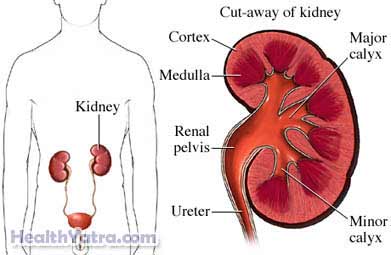Definition
Pyeloplasty is a surgery to repair the kidney. Specifically, it repairs a part of the kidney called the renal pelvis. The renal pelvis is a funnel-like structure. It connects the kidney to a tube called the ureter. This tube carries urine to the bladder.

Reasons for Procedure
Pyeloplasty is done if a blockage is found at the renal pelvis. This blockage prevents the urine from passing and makes the kidney swell.
Possible Complications
Complications are rare, but no procedure is completely free of risk. If you are planning to have a pyeloplasty, your doctor will review a list of possible complications which may include:
- Bleeding
- Infection
- Hernia near the surgical site
- Damage to tissues or organs
- Persistent leakage of urine
- Blockage of the ureter
Smoking may increase the risk of complications.
What to Expect
Prior to Procedure
A physical exam will be done before your surgery. Your doctor may also require blood and urine tests.
The bowels will also need to be cleaned. Your diet will be limited to clear liquids the night before. Do not eat or drink on the morning of the surgery.
Talk to your doctor about your medicines. You may be asked to stop taking some medicines up to one week before the procedure, like:
- Aspirin or other anti-inflammatory drugs
- Blood thinners, such as clopidogrel (Plavix) or warfarin (Coumadin)
Anesthesia
General anesthesia will be given. You will be asleep.
Description of Procedure
Pyeloplasty may be conducted by open surgery or laparoscopic surgery. A catheter will be placed to allow urine to drain.
During open surgery, an incision will be made in your side. The renal pelvis will be reconstructed. The blocked section of the ureter will also be removed. The remaining healthy sections of the ureter will be re-attached. The incision in the skin will then be closed with stitches.
Laparoscopic surgery only requires a few small incisions. Special tools will be passed through these incisions to complete the surgery. The repair steps are the same as the open procedure above.
In some surgeries, a temporary tube may be placed in the ureter. This will allow urine to pass while the ureter heals.
How Long Will It Take?
About 2-3 hours
How Much Will It Hurt?
Anesthesia will block pain during the surgery. You may have some pain after the surgery. Your doctor will recommend medication to help you manage the pain.
Average Hospital Stay
The usual hospital stay is 2-3 days. Your doctor may choose to keep you longer if complications arise. The stay may be shorter if you had a laparoscopic surgery.
Post-procedure Care
At the Hospital
You will receive medicine to ease discomfort. You may have some discomfort the first few time you urinate after surgery. It is also common to feel a frequent need to urinate. It will pass.
At Home
- If you are sent home with a drain or catheter, it may be removed one week after surgery. If no catheter was used, a follow-up appointment should be scheduled after surgery.
- Ask your doctor about when it is safe to shower, bathe, or soak in water.
- If you are given antibiotics, you need to take the full course. Do not stop early.
- Be sure to follow your doctor’s instructions for recovery.
Call Your Doctor
After you leave the hospital, contact your doctor if any of the following occurs:
- Signs of infection, including fever and chills
- Redness, swelling, increasing pain, excessive bleeding or any discharge from the incision site
- Nausea and/or vomiting that you cannot control with the medicines you were given after surgery, or which persist for more than two days after discharge from the hospital
- Pain that you cannot control with the medicines you have been given
- Pain, burning, urgency or frequency of urination, or persistent bleeding in the urine
- Difficulty urinating
- Any symptoms like those you had before surgery
In case of an emergency, call for medical help right away.
